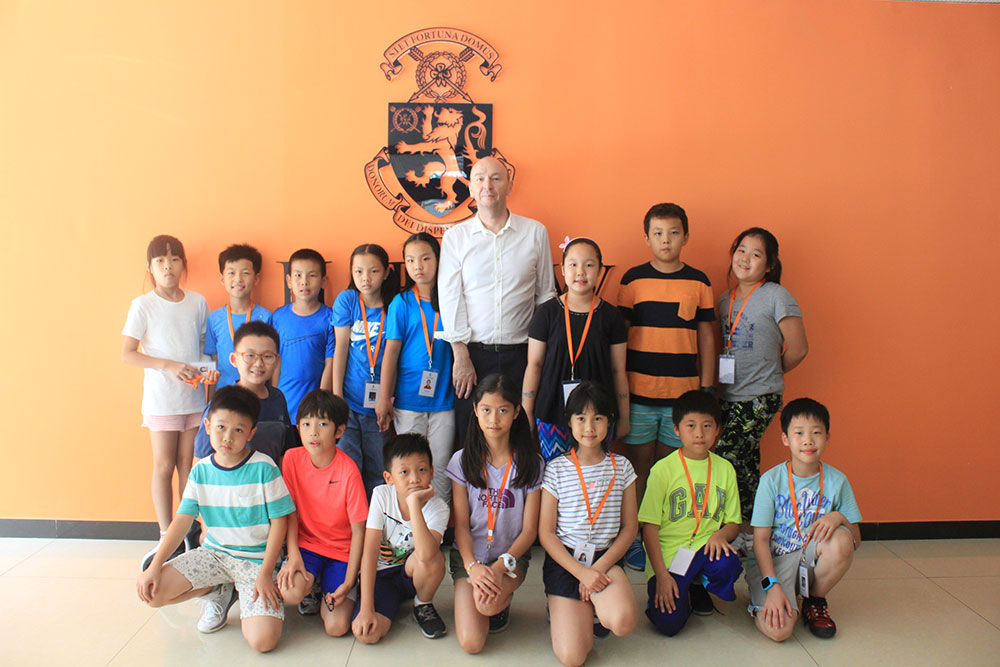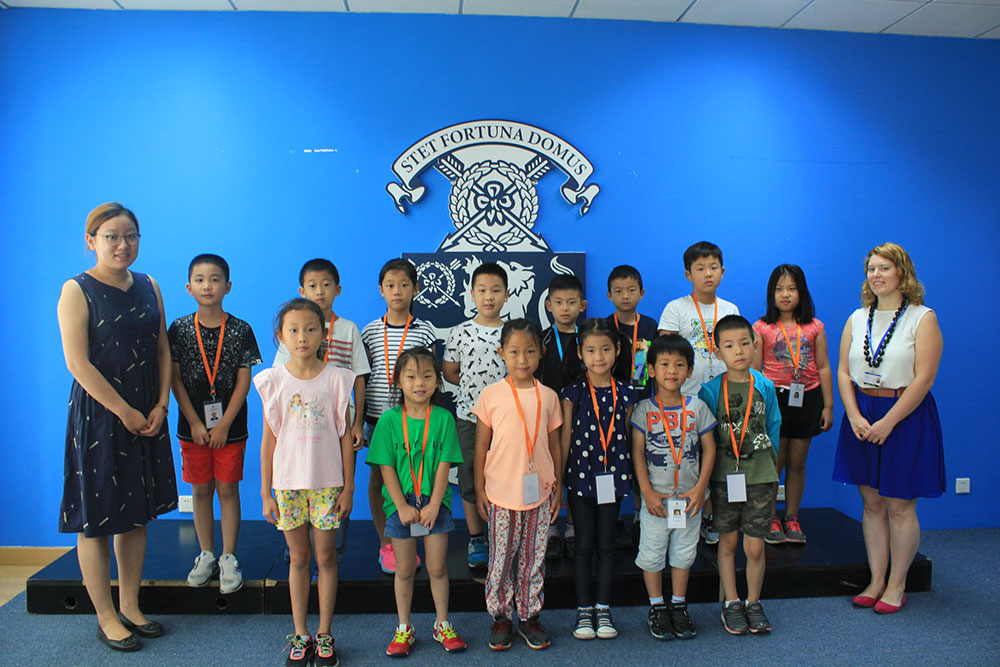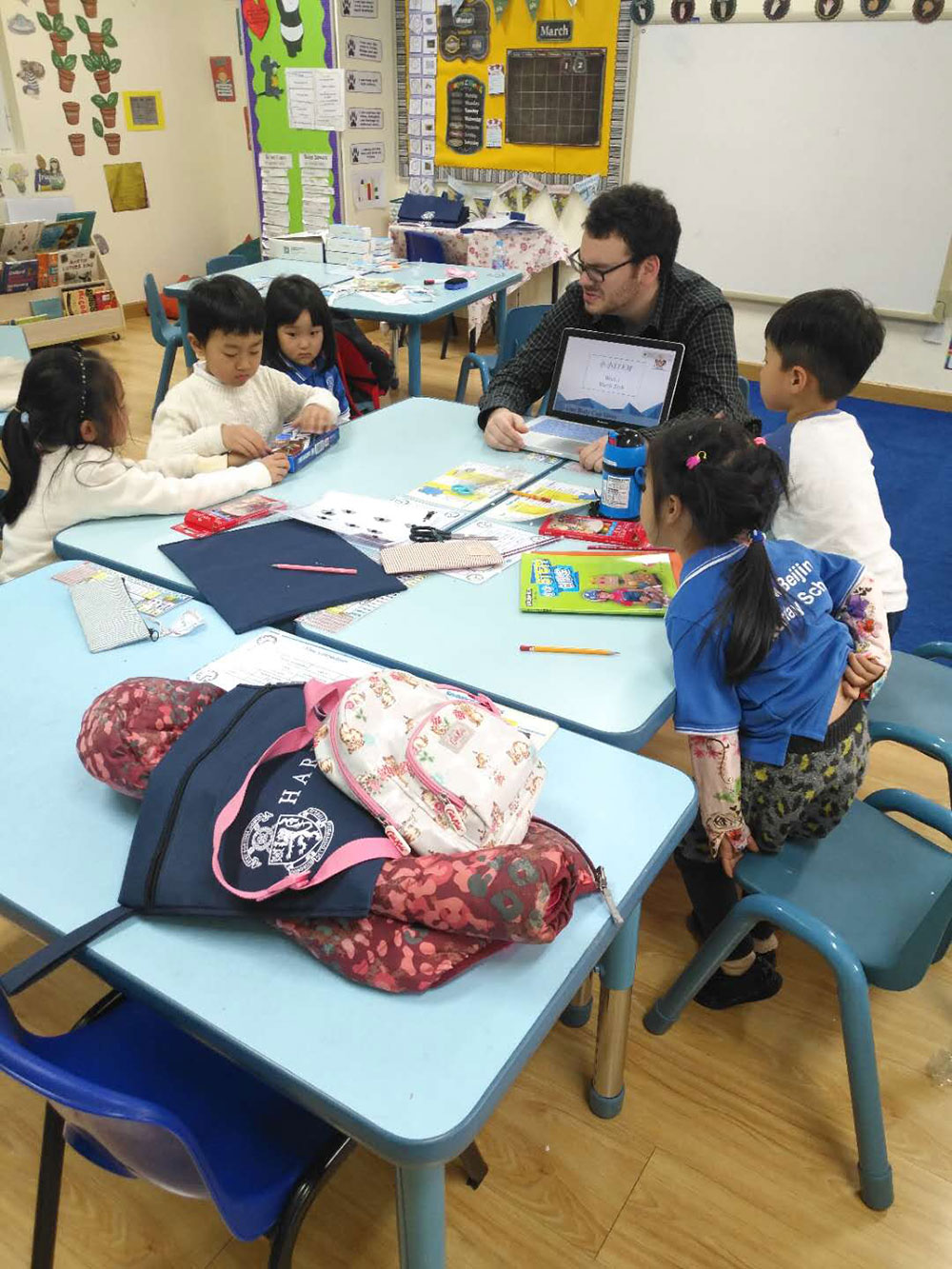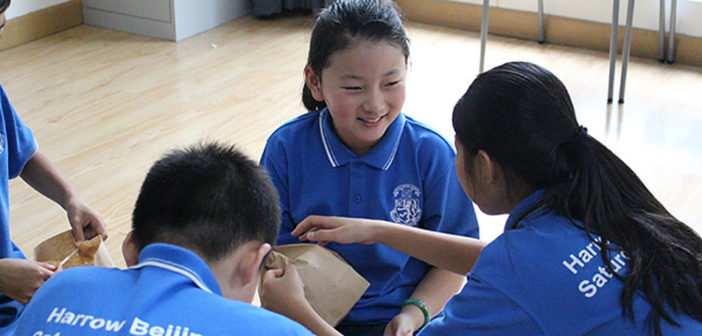
John Hopkins with students at Harrow Beijing summer camp.
Kids go to summer camps for a variety of reasons. For some, it’s a necessity as working parents can’t take the summer off to look after them. For others, it’s an adventure, taking the opportunity to develop new skills and grow more independent.
But learning is also a key aspect of summer camps. We’ve written before (June 2016 issue) about the risks of summer fallback, and teachers often talk about the first few weeks of the autumn semester being spent recapping the lessons of the previous year. So how do camp providers combine quality education with summer fun?
We talked to senior educators at two very different Beijing schools, to find out how they plan and run their summer camps to meet the needs of both students and parents.
“For us, the primary thing is English,” John Hopkins of Harrow Beijing told us. Hopkins is Assistant Head Master, Communications at the school, which is a branch of the famous Harrow School in England. “English is the number one concern of most parents, and the requirement for most kids to improve.
“We only have Harrow teachers at the summer camp. They’re very experienced with local students and Asian students, bringing their language up to the level where they’re able to integrate. We have a very strong EAL (English as an Additional Language) Department, and they understand the difference in culture. In Western education, we talk about learning as a communicative process, a ‘to and fro’. That doesn’t happen as much in local education, so we have to teach not just vocabulary and grammar, but a mode of communication.
“For local students, that works out well because they often have a strong base in grammar and vocabulary. We can draw on that, but we want to get them to speak, and take away any fear. It’s important that students in a Western school express opinions, and learn to work in groups, to agree and disagree. Of course, that’s a cultural point of view, not an absolute right, but if children want to enter international education they need to be aware of that.”

There’s more to the camp than just English lessons though.
“The younger students do a STEM (science, technology, engineering,and math) course, while the older students do a leadership course,” Hopkins said. “That’s run by the California Association of Student Councils, which does leadership courses all over the world. We also offer courses run by LAMDA (London Academy of Music and Dramatic Art), where students are able to study prose public speaking or acting. They are entered into LAMDA exams, for which we’re the biggest test center in Asia. We’re proud that we’ve had 1,200 students take the test with a 99.8 percent pass rate!”
“What we do in the summer camp reflects what happens in school overall. It can be a bridge for students wishing to enter Harrow.”
Hopkins, who was born in Britain but spent his childhood in Australia, never attended summer camp himself as a child, saying he “grew up in a different era.” But Amanda Micossi, Principal of House of Knowledge Schools and Kindergartens (HoK) Chaoyang Park Campus, has happy memories of her own time at camp.
“I went to Girl Scout summer camp every year as a student and absolutely loved it!” she told us. “We spent the whole time outside in the woods, hiking, swimming, and learning cool outdoor skills like how to build a fire, tie knots, and even shoot a bow and arrow. It was a sleep-away camp, and I loved feeling grown up enough to live with my friends in a cabin for a few weeks, away from our parents.”
Although the 3- to 7-year-olds who attend HoK’s camps are too young for “sleep-away,” Micossi brings the same sense of adventure to each session.
“As our camp is an ‘Around the World’ adventure, our first task is to choose the countries we’ll explore,” she said. “We make an effort to include a variety of countries, with different climates, languages, cultures, and traditions. The next step is choosing activities; each country gets a team of teachers who do some research to find a song, a game, and an activity (for example, art or cooking) that would be interesting for our age group. This year, the camp will probably include some German elements because we are doing an exclusive education trip to Germany for families, so that’s a nice connection.”
“House of Knowledge is inspired by the Reggio Emilia approach. In our classes, students are involved in planning the activities and choosing the direction of projects, but for camps, we need a bit more advance planning! We keep the hands-on, active exploration aspect alive in our summer camp by carefully choosing activities that students can do without too much support from teachers. ”
We asked how she balances fun and learning in the camp, but Micossi soon put us right.
“Is this a trick question?” she said. “Learning is fun! Our goal is to have students engage with and explore different cultures from around the world, so we do things like design colorful mosaics, play hacky sack, and bake pumpkin empanadas. By doing these fun activities, students are learning important lessons about the world they live in.”
“We hope to instill in our students an international awareness and cultural sensitivity by exposing them to many different cultures in a fun and interactive way. While they’re busy playing games, cooking delicious food, trying on interesting clothes, or enjoying an art project, they’re also getting a little taste of the wide variety of things the world has to offer. Students have a ‘HoK Passport’ and get stamps from the countries they’ve learned about—by the end, it is an impressive collection!”

Students (top) develop teamworking skills at Harrow Beijing with John Hopkins (middle), Assistant Head Master.
Camping Language
In any international educational environment, different levels of ability in different languages can present a challenge. For Harrow’s camps with their EAL focus, tackling this issue is particularly important.
“The students are divided into year groups,” Hopkins said, “and there’s an entry test. If their English is not good enough, they are not able to join the course. They have to meet a certain level of qualification, that’s true of the school in general.
“But above and beyond that, in any class in any school, there will be different levels of ability. A good teacher should be able to differentiate. And there, I think, is one of the key values of having only professional teachers on the summer program.”
Micossi agrees about the importance of skilled teachers in dealing with this problem.
“We’re lucky to have a big, dedicated, and multilingual team of teachers in each summer camp group,” she said. “Our language approach is, ‘one teacher, one language,’ so our Chinese teachers are always around to help.”
Making the Team Work‘
Most students attending HoK camps also attend the school, but there are also new friends to get to know.
“Starting every day with a special Circle Time routine sets the students off on the right foot, bringing them together as a group and letting everyone get to know each other before jumping off into activities,” Micossi said. “We also give each class its own name, lending a sense of identity for the newly created group.”
Camps at Harrow Beijing, where the mix of their own students and others is closer to 50:50, also use warm-up activities and icebreakers.
“It’s a major challenge on two levels,” Hopkins said. “Often students won’t have any experience of teamwork in their own school. We have to set up activities well, we can’t just say ‘break into teams and do this’. It might be completely new to them.
“We talk about providing a ‘scaffold’ into the activity, to take them from where they are to where they need to be. We move gradually into teamwork over a week or two. So on a very simple level, we might start with individual speeches, then work towards a debate.”
The Importance of Summer Fun
We asked Hopkins what parents should look for when choosing a summer camp for their child.
“Most important,” Hopkins answered, “is the school being realistic about the child’s expectations of summer camp. There are some institutions where you walk in and every child is a genius who’s going to Harvard… Students need responsible and realistic advice.”
“Safeguarding policies are important too,” he added. “Have all the teachers been checked? It goes back to the whole thing about using professional, experienced staff. Unqualified teachers will waste kids’ time, and exhaust them. Spending hours and hours with them is counterproductive. There’s huge demand for our summer camps, we could double, triple, even quadruple the number of students. But we don’t because we want to maintain quality.”
Micossi emphasized the value of play for younger children.
“Some parents think of summer vacation as “wasted time” which could be better spent studying—everyone deserves the chance to relax, run, play, be in the sun, and try a wide range of different activities. Kids need time to recharge before the next school year, so I would really encourage parents to consider a ‘non-academic’ camp. Remember that playing is learning for young kids, so let up on the pressure for a few weeks and have some fun!”
Hopkins too talked about the importance of summer fun.
“If at the end of two to four weeks, you see a bunch of smiling children who have learned, then that’s a success. The last thing you want are kids who are more exhausted than at the end of summer term.”
Despite the differences in the ages of the children and the focus of the camps, the definition of success looks very similar for both.
“A great summer camp,” Micossi said, “is one where the kids leave each day excited, happy, and looking forward to the next adventure.”
“A number of children come into the school,” Hopkins told us, “and on the first day, they sit waiting to receive knowledge. By the end of two or three weeks, they’re actively participating, asking questions, agreeing and disagreeing. It’s remarkable how quickly you can change with the right scaffolding. We get parents coming back saying ‘my child has changed’. I think some of them are bit shocked!”

Photos: courtesy of HoK and Harrow Beijing, Dave’s Studio
This article appeared on p34-37 of beijingkids April 2018 issue




